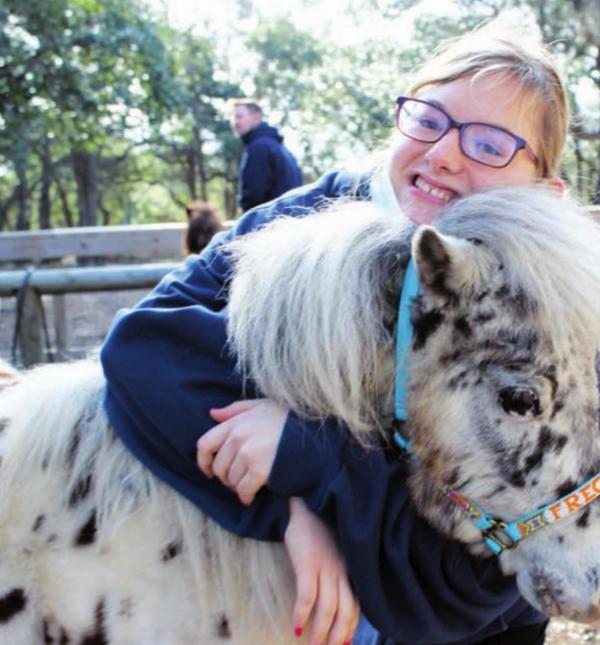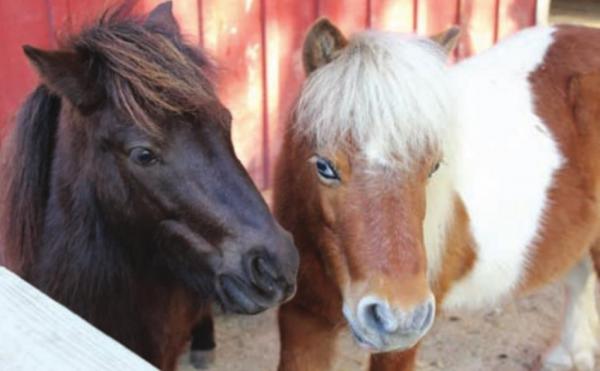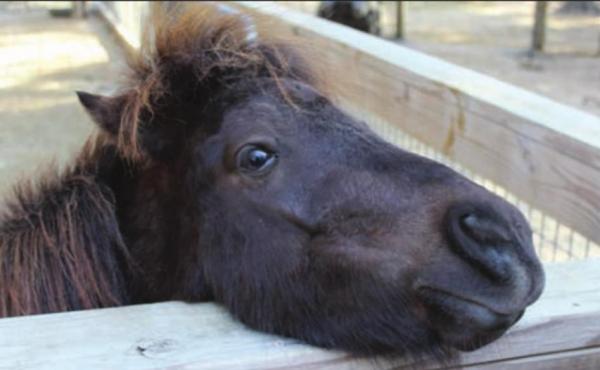Mini horses BIG HUGS
Freckles is a pretty mild-mannered fellow. He’s a miniature horse who travels around the area visiting senior citizens, marching in parades and allowing school kids to poke him and prod him and braid his mane.
There is one thing that kind of gets under Freckles’ coat: Don’t call him a pony.
Freckles is one of three miniature horses and three miniature donkeys that make up Mini Equine 2 U, a non-profit organization run by Wimberley residents Donna and Doug McLean. The McLeans take the horses and donkeys to senior-care facilities, shelters for abused kids and children’s camps. They also invite students to come to their ranch and bond with the animals.
Miniature horses stand about three feet tall and weigh around 175 pounds. Although, one of the donkeys, Tiny Tim, tips the scales at 350 pounds. “He’s a little overweight,” admits Doug. “He likes to eat. People think he’s pregnant, but he’s just well fed.”
Miniature horses — or “minis” — have been around since the 1600’s when they were bred to become unique pets for royalty. In the 1700’s, when the use of children in coal mines was outlawed, the miniature horses took over some of the duties. Today, the minis are mostly family pets, show horses and therapy animals.
The mini horses retain many of the characteristics — both physical and the personality —of their larger breeds. For example, spotted Freckles, is a tiny Appaloosa. A fullsized Appaloosa weighs around 1,000 pounds or more and stands 60 inches high at the withers (shoulder area).
A pony, on the other hand, tends to be heavier with a thicker body, heavier coat and shorter legs. The term pony is commonly used to describe almost any small horse. “Ponies, typically, can be pretty mean,” Donna points out.
No riders
As anyone who has ever attended a fair or carnival knows, ponies are for riding. No one rides the McLeans’ horses. Donna explains that a rider should only weigh about 20 percent of a horse’s weight which would mean the maximum a rider could weigh would be around 35 pounds for most minis.
The McLeans try to get the horses as babies so they can train them early to become therapy animals. When they are around senior citizens and little kids, kicking and biting is a no-no. Donna says the small donkeys are better suited to therapy work than the mini horses.
“Donkeys are better because they are slower,” says Donna, “but donkeys are much smarter than horses. Their disposition is a little more stubborn, but that’s because they have minds of their own.”
All the horses at Mini Equine 2 U are male which eliminates some distractions. Donna, who has been around horses her whole life, employs tactics such as popping balloons near them to gauge their reactions and get them used to startling noises they might encounter in public places.
“They are just like a dog. They have to trust you. They have to learn to trust you,” says Donna.
Donna loves her horses and loves what the horses mean to the people they meet. “The seniors (at assisted-living centers) will come out in their wheelchairs and walkers and you just see their faces light up.”
It can be emotional when the herd visits The Children’s Shelter in San Marcos. “You should see the smiles on their faces,” says Donna. “You just don’t know what some of these kids have been through. We try to make it nice for them for at least one day.”
Once a week, students from the 18+ program at Wimberley High and Hays High visit the D2 Ranch — Doug and Donna, D squared, get it? —in the Las Lomas subdivision to help exercise and groom the minis. The interaction is good for both teenager and horse.
Explains Wimberley High 18+ teacher Ryan Durkin: “The students who qualify for our program — generally special-education kids — come to learn job skills and help build their resumes. The goal is to get them jobs in the community. The horses help teach patience and responsibility. It’s a good thing for everyone.”
Jasper, one of the students who visits the five-acre ranch regularly, has grown from the experience. “He has really come along,” says Donna. “At first, he wouldn’t talk or even touch them.”
These days, Jasper leads Bubbles — a spotted miniature donkey who loves kids — out of the stable, brushes Bubbles’ long winter coat, walks him around the exercise pen, guides him over a low-to-the-ground “jump” and watches as Bubbles munches on grass.
Community help
Taking care of six little horses doesn’t come cheap. While they don’t eat as much as a full size horse, they still go through 800 pounds of hay every couple months. Then there’s veterinarian bills, farriers who tend to the horses’ hooves and vitamin supplements, as well as behind-thescenes expenses such as insurance.
The McLeans get help with grants from the Wimberley Community Civic Club and the Lion’s Club as well as private donations.
Mini Equine 2 U relies heavily on local volunteers. When the horses and donkeys attend a public event there are always two volunteers with each animal. They need to make sure no one sneaks up behind the animal or pokes it too hard.
Donna is always looking for volunteers to assist in the therapy sessions or help with grooming and exercise (the animals don’t do birthday parties and such). The qualifications to volunteer are pretty simple: “You have to love animals and you have to like people,” says Donna. “That’s it.”
Doug says the minis make good pets. They have been bred to be around people and are “very sweet.” The horses like a little room to roam and enjoy companionship, so he suggests getting, at least, two minis.
They can live to be 30 years old, so “it’s a longer commitment” than a dog or cat, says Doug, who works for a software company in Austin. Then pointing to two-year-old Bingo, Doug observes: “I’ll be 90 by the time that one goes.”
The excited kids. The smiles on the faces of senior citizens. The blossoming of a special-needs student. Donna finds it all rewarding: “This has truly been a joy for me. Giving back to the community. It’s incredible.”
To find out more about Mini Equine 2 U or to volunteer, go to the website www.miniequine2u.org or call 512-466-0067.




